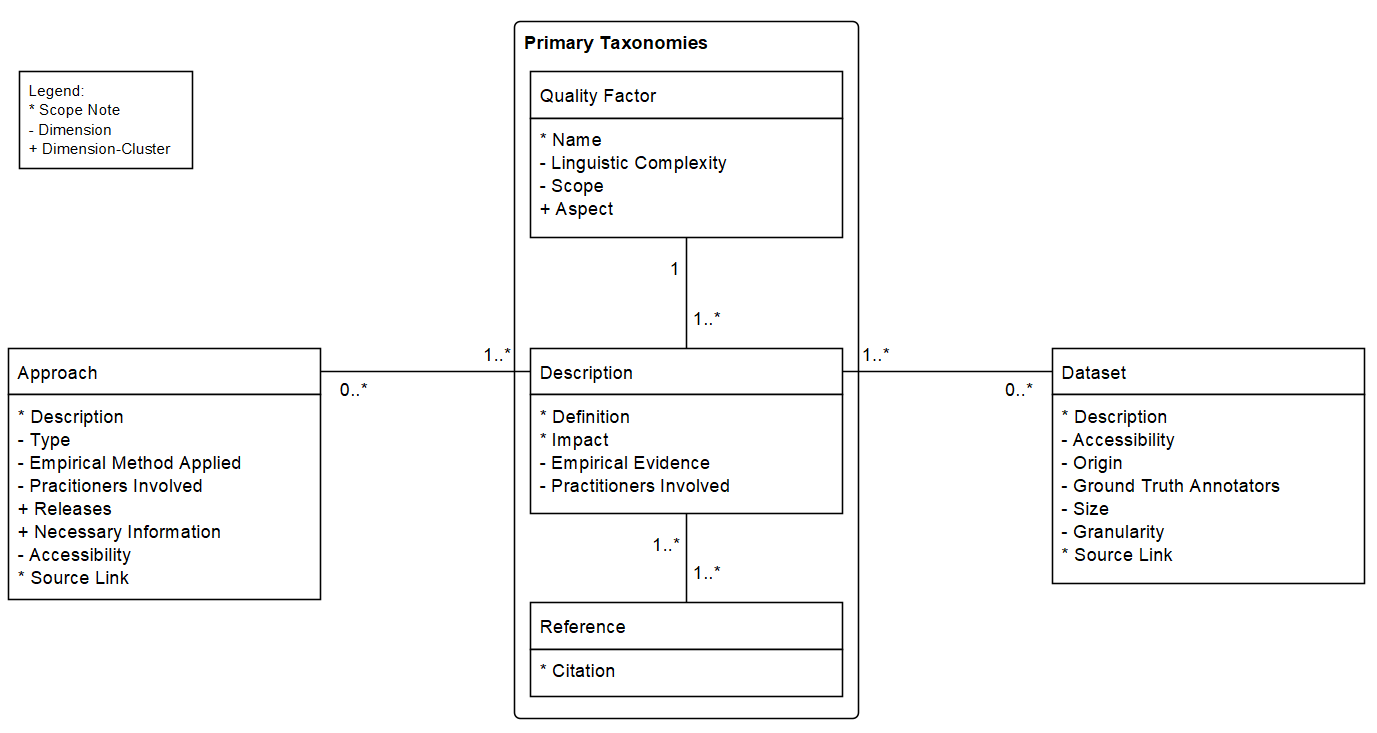
The requirements quality factor ontology is a joint initiative from the requirements quality research community to make the concept of quality factors visible, accessible, and usable. A quality factor is a normative metric which maps a textual requirement of a specific granularity to a scale which informs about the quality of this input. Factors can be evaluated on textual input without any human intervention, which makes them perfect tools for early and integrateable requirements quality assurance.
The following diagram represents the current structure of the ontology. Click the diagram (or the button below) or select a specific taxonomy in the dropdown meny under "Content" to access the content of the ontology.
Browse through previous publications ( ), associated artifacts (), and an accessible demos ( ) where applicable.
See the current members of the requirements quality factor ontology initiative below. Feel free to contact us at any time - especially in case you are interested to contribute to the project.

Julian Frattini is a PhD student at the Blekinge Institute of Technology, Sweden, under the supervision of Daniel Mendez. His research revolves around the notion of 'good-enough requirements engineering', which incorporates exploring the potential of causality in requirement artifacts for quality emendations.

Lloyd Montgomery is a PhD student at the University of Hamburg, Germany, under the supervision of Walid Maalej. His research interests revolve around recommender systems, requirements quality, and natural language processing for requirements engineering.

Jannik works as a consultant at Netlight and as a Post-doctoral researcher at fortiss. His research focuses on modern Natural Language Processing techniques and their potential to support stakeholders in the software engineering process. He has already published at several top venues (e.g. ICST, ESEM) and won the Best Industry Paper Award at ESEM'20 and Best Research Paper Award at REFSQ'21.

Daniel Mendez is Professor for Software Engineering at the Blekinge Institute of Technology, Sweden, and Senior Scientist heading the research division Requirements Engineering at fortiss, the research institute of the Free State of Bavaria for software-intensive systems and services.

Michael Unterkalmsteiner has been researching Software Engineering since 2009, focusing in particular on the coordination between requirements engineering and software testing. His research work with many industry partners is shaped by empirical problem identification, in-depth analysis of the state-of-art and practice, and collaborative solution development.

Davide Fucci is an assistant professor (senior lecturer) at the Blekinge Institute of Technology. His research interest focus on various aspects of software and requirements engineering, such as data-driven requirements engineering, developers' affect, behaviors, and cognition, as well as agile testing (including security testing).
The requirements quality factor ontology is far from complete: on the one hand, improving the structure of the ontology requires including as many perspectives of the requirements quality research community as possible, and on the other hand, identifying all relevant publications which contain eligible objects (factors, data sets, and approaches) for the content of the ontology is an extensive endeavor. Hence, we extend an invitation to a joint community effort.
If you are interested in requirements quality and specifically the notion of quality factors, consider contributing to the ontology. We aim at enhancing and maintaining the ontology in order to provide (1) a structure guiding reporting new quality factors and (2) a repository containing existing factors, data sets, and approaches for visibility and easy reuse. In the first step, we need your help to identify relevant publications containing quality factors and related elements. If you are interested, contact us using the button below.